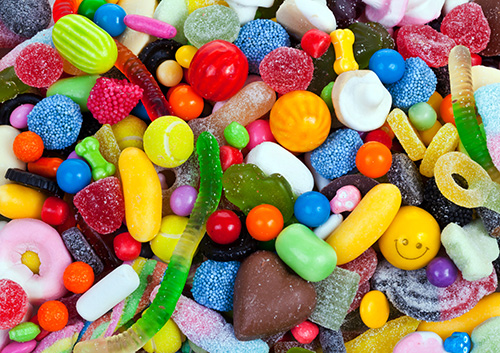October 17th, 2018

Most kids love candy; actually, most people in general love candy. So when it comes time for you to get braces there can often be a natural conflict between candy consumption and maintaining the integrity of your braces. For that reason, Dr. Andrew Schwartz and our team know that it’s good to know which types of candy are not good for your braces. To better illustrate, here are some candies that you will want to avoid.
Caramel
Caramel is a sweet and often exceedingly sticky and chewy type of candy that just does not mix well with braces. Caramel can cause a mess in regular teeth, but teeth with braces are a whole other story. The sticky candy can very easily get lodged and stuck between the teeth, gums, and braces, making for a difficult task of cleaning your mouth. And if your teeth don't get cleaned properly, cavities can easily form. If you get cavities while you have braces, that could mean additional appointments at our Washington DC office and an extended treatment time.
Salt Water Taffy
Another sticky and chewy candy to avoid with braces is salt water taffy. For many of the same reasons as caramel, it is best to avoid taffy until you get your braces removed. It may be a long wait, but when it comes to the health of your teeth, and the purpose of your braces, it really is best to avoid taffy.
Popcorn
Popcorn of any kind is best to avoid when you have braces. The kernels can easily do damage to the braces as you chomp on them, and they can get stuck between your teeth and the braces causing discomfort and further complications. In this sense it does not matter which flavor of candy popcorn you eat, all popcorn is bad news until you get your braces off.
Generally speaking, any candy that is chewy, crunchy, or sticky is not a good idea to eat with braces in your mouth. These types of candy will make life wearing braces much more difficult than if you were to just wait until your braces come off. With a little patience you will be back to eating all your favorite candy again, and with straightened teeth at that.
October 10th, 2018

It's a habit many people have and not only can it be annoying to the people around you, it can be detrimental to your dental health. Chewing ice is so common that it even has its own name, pagophagia. We're not talking about a slushy or shaved ice (although those artificially sugary treats should be avoided too!) but more like the hunks of ice rattling around in the bottom of your glass.
Ice chewing can be a sign of emotional problems like stress or obsessive-compulsive disorder, but it can also be a marker for iron deficiency anemia and other physical problems. Then again, some people just like to have something to chew on. For whatever reason you find yourself chewing on it, it's a habit you need to break.
Chewing on ice can cause:
- Chipped and cracked teeth
- Damaged enamel
- Sore jaw muscles
- Damage to dental work such as crowns, fillings, or other appliances
If chewing on ice is becoming a problem in your life, don’t hesitate to speak with Dr. Andrew Schwartz about it. But if you find yourself still wanting to chew on something, here are a few alternatives to ice:
- Baby carrots
- Celery sticks
- Sugar-free (xylitol) gum
We know you need to chill sometimes, but chomping down your entire glass of ice is not the way to do it. If you have any other questions on the topic, feel free to talk with a member of our Washington DC team. It may be beneficial in solving the issue and helping to remediate any damage to your teeth.
October 3rd, 2018

If this is your child’s first holiday season with braces, here are some tips on how to help children get the most enjoyment from these celebrations without compromising their braces or leaving them feeling left out of the festivities.
Halloween
When you think dental health, “Halloween” is not usually the first thing that comes to mind. Halloween can be tricky, but with some planning and intervention, you can make sure your child doesn’t miss out on the treats that make the holiday a favorite.
Braces present other challenges besides dealing with the scary amount of sugar in every trick-or-treat bag. Certain treats can be a challenge to clean from braces, and can even cause broken brackets and wires. How to avoid these frightful results?
- Go through your child’s treat bag when you get home after neighborhood trick-or-treating. Anything which can damage braces, such as regular gum, candy with nuts or caramel, or hard or chewy candies should be discarded. Perhaps you and your child can choose a selection of soft candy such as plain chocolate and peanut butter cups to trade for those tricky treats. Your child’s favorite soft fruits, cupcakes, and cookies could also be safe substitutes.
- Party time? Candy apples, bowls of candy corn, and popcorn balls are favorite treats at Halloween parties, but very bad for braces. Help your child recognize what should be avoided before attending, and suggest safe options like soft cupcakes.
- Finally, even safe treats will leave more sugar than normal in your child’s mouth and therefore more potential for plaque build-up. Brush and floss more often, if needed, and rinse regularly with water.
Talk candy guidelines over in advance with your child. If you’d like, Dr. Andrew Schwartz can recommend safe alternatives. With your help, Halloween won’t be a fearsome experience for you or your trick-or-treater.
Thanksgiving
Now, this is a holiday to be thankful for! Almost all of your traditional favorites are perfect for family members with braces.
- Appetizers: Offer soft food options such as silky cheeses and deviled eggs instead of crunchy vegetables, chips, and nuts.
- Dinner: Turkey is a required dish on many tables, and no need to miss out! Just make sure pieces are bite-size and off the bone. Creamy mashed potatoes and gravy and jellied cranberry sauce are also braces-friendly traditions. Any cooked vegetable should be fine, but do cut the corn from the cob first. Dressing is a great side dish if your child avoids any crunchy tops and edges, as are soft, nut-free rolls and muffins.
- Dessert: Pumpkin pie, cheesecake, and apple pie with ice cream are all safe (and delicious) choices. Leave the pecan pie, caramel sauce, and anything nutty or chewy off your child’s menu. And remember to brush and floss carefully after the feast!
If you are concerned that following the usual food guidelines might be a little more difficult during this time of year, talk to us. Dr. Andrew Schwartz and our team are happy to suggest ways to make your child’s first holidays with braces memorable for all the right reasons. The last thing you’ll want is an emergency visit to our Washington DC office!
September 26th, 2018

At Capitol Orthodontics, we know orthodontic emergencies are neither convenient nor timely. If you are a patient of record, Dr. Andrew Schwartz and our team are more than willing to see you after hours or over the weekend. As a general rule, you should call our Washington DC office when you experience severe pain or when you have a painful appliance problem that you can’t take care of yourself. We’ll be able to schedule an appointment to resolve the problem. If you have an orthodontic emergency after regular office hours, please give us a call and follow the emergency prompts to contact one of our doctors.




